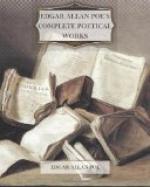Finally, all men saw that astronomical knowledge
lies not, and they awaited the comet. Its approach
was not at first seemingly rapid, nor was its appearance
of very unusual character. It was of a dull
red, and had little perceptible train. For
seven or eight days we saw no material increase in
its apparent diameter, and but a partial alteration
in its color. Meantime, the ordinary affairs
of men were discarded, and all interest absorbed
in a growing discussion instituted by the philosophic
in respect to the cometary nature. Even the
grossly ignorant aroused their sluggish capacities
to such considerations. The learned now
gave their intellect—their soul—to
no such points as the allaying of fear, or to the
sustenance of loved theory. They sought—they
panted for right views. They groaned for perfected
knowledge. Truth arose in the purity of her
strength and exceeding majesty, and the wise bowed
down and adored.
That material injury to our globe or to its inhabitants would result from the apprehended contact was an opinion which hourly lost ground among the wise; and the wise were now freely permitted to rule the reason and the fancy of the crowd. It was demonstrated that the density of the comet’s nucleus was far less than that of our rarest gas; and the harmless passage of a similar visitor among the satellites of Jupiter was a point strongly insisted upon, and which served greatly to allay terror. Theologists, with an earnestness fear-enkindled, dwelt upon the biblical prophecies, and expounded them to the people with a directness and simplicity of which no previous instance had been known. That the final destruction of the earth must be brought about by the agency of fire, was urged with a spirit that enforced everywhere conviction; and that the comets were of no fiery nature (as all men now knew) was a truth which relieved all, in a great measure, from the apprehension of the great calamity foretold. It is noticeable that the popular prejudices and vulgar errors in regard to pestilences and wars—errors which were wont to prevail upon every appearance of a comet—were now altogether unknown, as if by some sudden convulsive exertion reason had at once hurled superstition from her throne. The feeblest intellect had derived vigor from excessive interest.
What minor evils might arise from the contact were points of elaborate question. The learned spoke of slight geological disturbances, of probable alterations in climate, and consequently in vegetation; of possible magnetic and electric influences. Many held that no visible or perceptible effect would in any manner be produced. While such discussions were going on, their subject gradually approached, growing larger in apparent diameter, and of a more brilliant lustre. Mankind grew paler as it came. All human operations were suspended.
There was an epoch in the course of the general sentiment when the comet had attained, at




